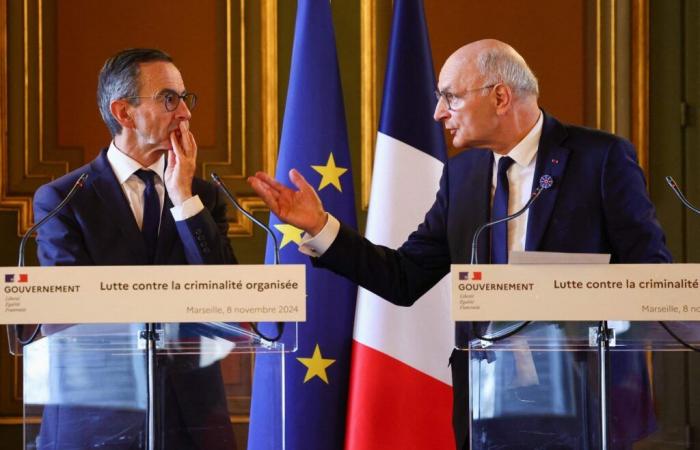Ggang war in a growing number of cities, repeated shootings punctuated by the deaths of increasingly young adolescents, drug traffickers with increased financial power and influence operating even from their prison cells… The observation hardly makes any doubt: France, after other European countries, is grappling with the scourge of drugs in new dimensions. Criminal groups thrive there on an illicit market estimated at more than 3.5 billion euros, posing an increasingly serious threat to the life of entire neighborhoods as well as to public health and even democracy.
Asymmetrical, unequal, the fight between traffickers ready to do anything and a democracy based on the rule of law requires a strengthening and adaptation of institutions and procedures. The announcements made in Marseille, Friday, November 8, by the Minister of the Interior, Bruno Retailleau, and by the Minister of Justice, Didier Migaud, go in this direction: the creation of a “national prosecutor’s office” against organized crime, now punishable by special assize courts composed only of magistrates to avoid pressure on juries, and the improvement of the regime of repentants who collaborate with justice are among the logical proposals inspired by a bill senatorial following the report of the commission of inquiry published in May, as well as by the projects of former minister Eric Dupond-Moretti.
Read also | Article reserved for our subscribers Narcotrafic: the Retailleau-Migaud duo agrees on a completely repressive plan
Read later
However, several unclear areas surround this legislative mechanism, the parliamentary examination of which is planned for 2025, in particular on the precise perimeter of the new public prosecutor’s office and the rise in power of the current Anti-Narcotics Office. As for the immediate measures announced on Friday, they remain unclear both on the reinforcement of the staff of the Paris prosecutor’s office, to which a “coordination cell” would be attached, and on the resources devoted to jamming the telephone conversations of detainees at the “top of the criminal spectrum” , who would be assigned to specialized prison areas.
Need for strong action on demand
But the martial language used by the two ministers displaying their desire to “stand together”beyond their differences in political sensitivity, cannot mask the large blind spots of their announcements, with which, significantly, the Minister of Health was not associated: information on addictions, reduction of risks for drug users and the treatment of drug addicts.
Read also | Article reserved for our subscribers Drug use: the main stages of “risk reduction” in health policy
Read later
Essential, the repression of trafficking and the pressure on the supply of illicit substances cannot be exercised effectively without, at the same time, solid action on demand and without a debate, nourished by foreign experiences, on the benefits and risks of partial decriminalization. At a time when consumption is becoming commonplace in many environments, from the most precarious to the most privileged, public authorities should also work to construct and disseminate a counter-narrative opposing that of social advancement through traffic.
A true “national cause”, the battle against drug trafficking requires building the conditions, if not for a consensus, at least for a political majority. This requires not only the addition of a solid preventive component, but also that the government distance itself from the confusion between drugs and immigration that the Minister of the Interior continues to maintain.
Read also | Article reserved for our subscribers Fight against drug trafficking: Retailleau in search of political consensus
Read later






